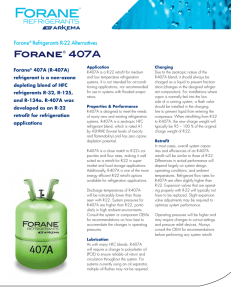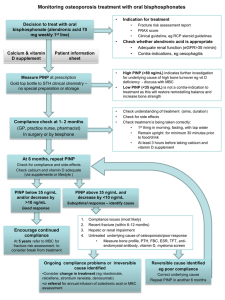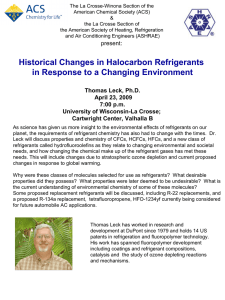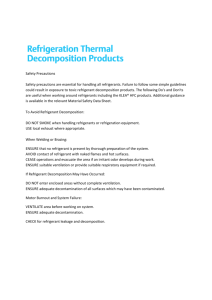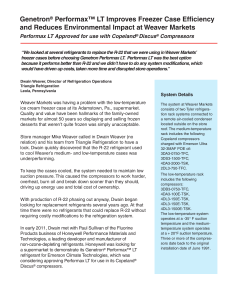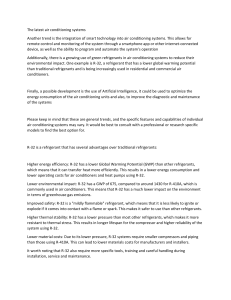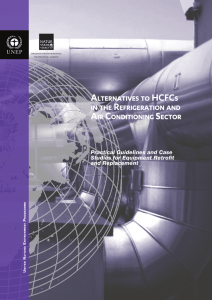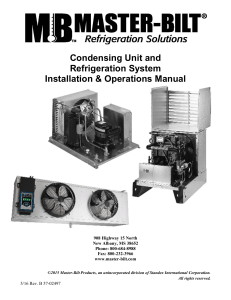Refrigerants and Your Air Conditioning System
advertisement
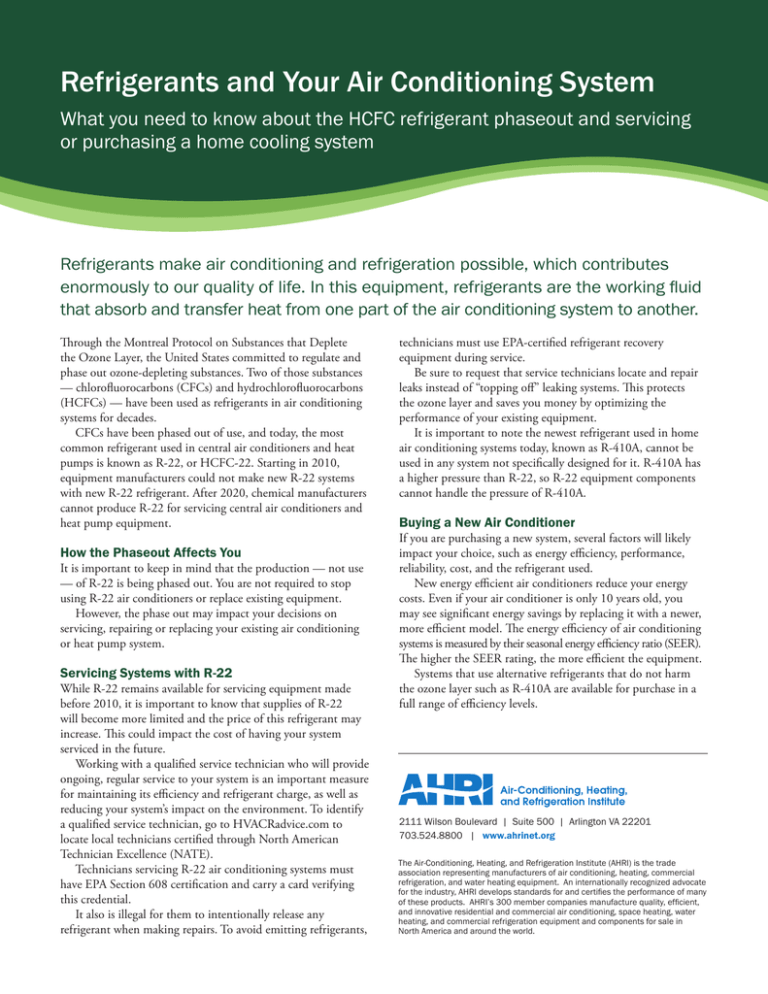
Refrigerants and Your Air Conditioning System What you need to know about the HCFC refrigerant phaseout and servicing or purchasing a home cooling system Refrigerants make air conditioning and refrigeration possible, which contributes enormously to our quality of life. In this equipment, refrigerants are the working fluid that absorb and transfer heat from one part of the air conditioning system to another. Through the Montreal Protocol on Substances that Deplete the Ozone Layer, the United States committed to regulate and phase out ozone-depleting substances. Two of those substances — chlorofluorocarbons (CFCs) and hydrochlorofluorocarbons (HCFCs) — have been used as refrigerants in air conditioning systems for decades. CFCs have been phased out of use, and today, the most common refrigerant used in central air conditioners and heat pumps is known as R-22, or HCFC-22. Starting in 2010, equipment manufacturers could not make new R-22 systems with new R-22 refrigerant. After 2020, chemical manufacturers cannot produce R-22 for servicing central air conditioners and heat pump equipment. How the Phaseout Affects You It is important to keep in mind that the production — not use — of R-22 is being phased out. You are not required to stop using R-22 air conditioners or replace existing equipment. However, the phase out may impact your decisions on servicing, repairing or replacing your existing air conditioning or heat pump system. Servicing Systems with R-22 While R-22 remains available for servicing equipment made before 2010, it is important to know that supplies of R-22 will become more limited and the price of this refrigerant may increase. This could impact the cost of having your system serviced in the future. Working with a qualified service technician who will provide ongoing, regular service to your system is an important measure for maintaining its efficiency and refrigerant charge, as well as reducing your system’s impact on the environment. To identify a qualified service technician, go to HVACRadvice.com to locate local technicians certified through North American Technician Excellence (NATE). Technicians servicing R-22 air conditioning systems must have EPA Section 608 certification and carry a card verifying this credential. It also is illegal for them to intentionally release any refrigerant when making repairs. To avoid emitting refrigerants, technicians must use EPA-certified refrigerant recovery equipment during service. Be sure to request that service technicians locate and repair leaks instead of “topping off” leaking systems. This protects the ozone layer and saves you money by optimizing the performance of your existing equipment. It is important to note the newest refrigerant used in home air conditioning systems today, known as R-410A, cannot be used in any system not specifically designed for it. R-410A has a higher pressure than R-22, so R-22 equipment components cannot handle the pressure of R-410A. Buying a New Air Conditioner If you are purchasing a new system, several factors will likely impact your choice, such as energy efficiency, performance, reliability, cost, and the refrigerant used. New energy efficient air conditioners reduce your energy costs. Even if your air conditioner is only 10 years old, you may see significant energy savings by replacing it with a newer, more efficient model. The energy efficiency of air conditioning systems is measured by their seasonal energy efficiency ratio (SEER). The higher the SEER rating, the more efficient the equipment. Systems that use alternative refrigerants that do not harm the ozone layer such as R-410A are available for purchase in a full range of efficiency levels. 2111 Wilson Boulevard | Suite 500 | Arlington VA 22201 703.524.8800 | www.ahrinet.org The Air-Conditioning, Heating, and Refrigeration Institute (AHRI) is the trade association representing manufacturers of air conditioning, heating, commercial refrigeration, and water heating equipment. An internationally recognized advocate for the industry, AHRI develops standards for and certifies the performance of many of these products. AHRI’s 300 member companies manufacture quality, efficient, and innovative residential and commercial air conditioning, space heating, water heating, and commercial refrigeration equipment and components for sale in North America and around the world.
